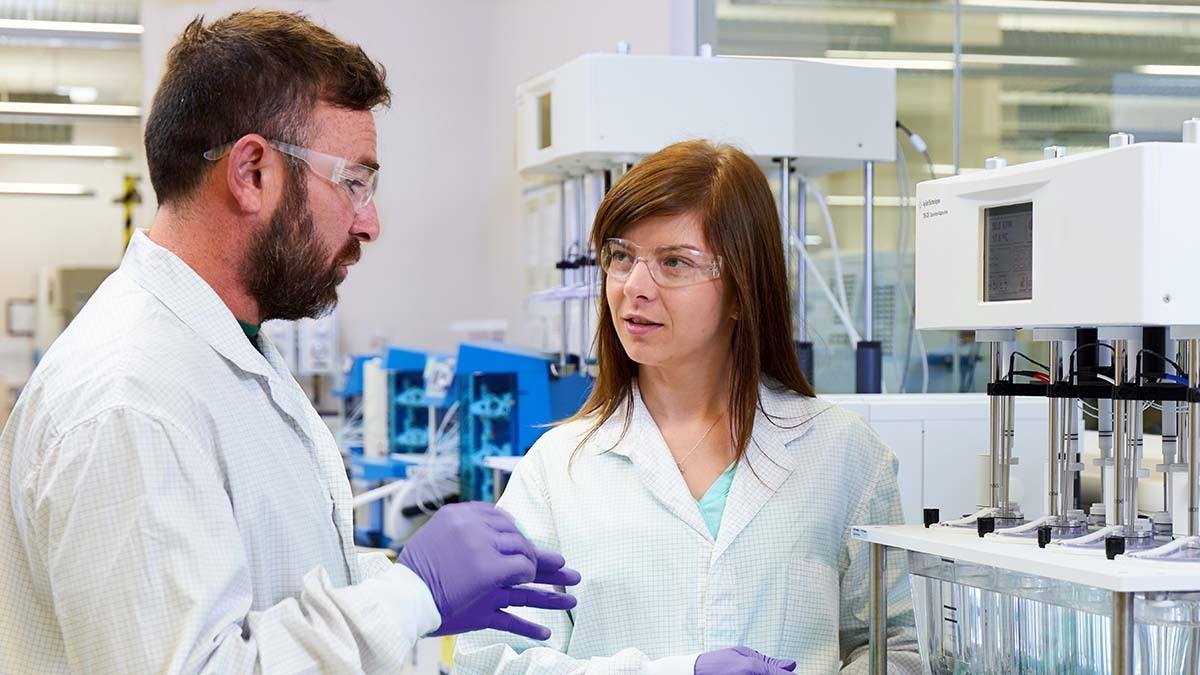
Four Key Attributes of Contract Chemistry Manufacturing and Controls (CMC) Labs

Contract labs for chemistry manufacturing and controls services, also known as good manufacturing practice (GMP) labs, are critical parts of the drug development process. The best GMP labs are partners in clinical research that offer broad testing coverage, advanced systems for troubleshooting and robust strategies to reduce error. In turn, they enable sponsors to develop drugs and get them to market faster.
Current good manufacturing practice (cGMP) is the primary regulatory standard for guaranteeing pharmaceutical quality. Contract GMP labs are highly regulated. Given the nature of their work, they must adhere to the five P’s of GMP:
- People with clear roles
- Well-documented procedures with precise standards
- Premises and equipment that are validated and calibrated, and have procedures, schedules and records
- Well-defined processes, so that every action can be repeated with the same result
- Consistent methods should be followed, and specifications and standards should be available across product materials, manufacturing, testing, etc.
While these are the most fundamental competencies for any manufacturing practices, good contract GMP labs become great when they demonstrate four key attributes:
- Advanced testing and analysis
- Proactive analytical approaches
- Well-designed quality systems
- Strong error-reduction processes
GMP laboratories with these attributes are known to better respond to clients’ needs with experienced staff, the latest technology, quality service and a high degree of flexibility.
Keep reading to learn more about how GMP labs with these key attributes provide drug developers an edge.
1. Advanced testing and analysis
Any competent GMP laboratory can be defined by its analytical performance supporting pharmaceutical manufacturing operations and overall testing coverage. Essentially, that’s the ability to get things done well the first time with competitive turnaround times while integrating with third-party manufacturing or supply chain operations. For mature GMP labs, associated personnel and combined capabilities deliver an elevated level of support.
In other words, expert GMP labs do not solely interact with well-defined testing programs; they add value above and beyond the data. PPD Laboratory services’ GMP lab, for example, integrates deep scientific expertise and a strong knowledge of chemistry, manufacturing and controls (CMC) with required analytical control strategies – both of which add significant value.
2. Proactive analytical approaches
Pharmaceutical manufacturing and supply chain scenarios closely aligned to drug release testing strategies require proactive analytical approaches. The success of a product or process being studied depends upon laboratory output, as well as related conclusions from validated and verified testing data. Together, this creates a link beyond the realm of the clinical development work performed by the contract laboratory, laboratory scientists and pharma project leaders.
Collectively, this clinical development team drives analytical activities that verify manufacturing output and compliance with market authorizations. In routine testing, overseeing this is generally straightforward, but the presence of an atypical event during manufacture or an atypical result generated during quality control testing requires the analytical know-how to develop a conclusion from a quality, scientific and overall CMC perspective. As such, a GMP lab that demonstrates initiative is crucial to identifying anomalies and developing strategies to intervene.
A large pharmaceutical company recently contracted with PPD Laboratory services’ GMP lab to identify N-nitrosodimethylamine (NDMA) in its drug product – and to do so quickly to meet regulatory timeline requirements. Here’s how the initiative-taking analytical approach enabled speedy resolution:
- PPD Laboratory services has worked in nitrosamines for nearly two decades and has a large, experienced staff, so the project stood up quickly, with 80 samples evaluated in the first week.
- Most of the test results were below the limit for NDMA, but some were significantly higher. With its proactive approach, PPD’s team had already noted commonalities among the high-NDMA samples by the time they identified the trend.
- Ultimately, those products were traced to a single manufacturing site, and the pharmaceutical company was able to pass its NDMA testing.
3. Well-Designed Quality Systems
Quality systems and processes are at the core of successful laboratory services. Systems and processes with clear and consistent instructions – and the most up-to-date regulatory guidance – create a quality system framework and deliver a consistent testing approach.
Laboratory-quality tools – such as root cause analysis, 5 Whys, fishbone analysis, etc., – add value and knowledge to pharmaceutical testing programs and minimize the need to troubleshoot. Well-designed quality systems and processes, in conjunction with well-trained scientists, robust and validated methods and a suitably designed laboratory facility, all significantly improve GMP lab performance.
As an example, a client utilized PPD Laboratory services to develop customized assays and testing for two inhaled drug-device combination asthma products. The requirements for these studies posed some challenges for the client, including the need for accelerated ramp-up, considerable lab space and storage capacity and specialized expertise. PPD’s team was able to deliver results quickly thanks to our large capacity, highly qualified staff and high-quality systems that allowed work on the project to begin and finish in record time.
4. Strong Error-Reduction Processes
Human error occurs – but a distinction between good and great GMP labs is the disciplined approach to analyze, prevent and train around error reduction. Incorporating error-reducing steps into approved methods or standard operating procedures as part of continuous improvement is vital to a contract GMP lab’s success. With strong error-reducing processes in place, the organization can resolve issues faster, create more robust preventative actions and improve the quality of the laboratory over the longer term.
Ultimately, the GMP laboratory is at the heart of a drug developer’s ability to supply pharmaceuticals to patients – so identifying a partner that is committed to quality is critical to maintaining key drug supplies.
High-performing GMP labs share key attributes. They have robust testing systems in place, as well as a culture of initiative-taking. They emphasize quality in all things and take steps to reduce error. By incorporating advanced testing, proactive approaches, quality-focus and error-reduction policies, procedures and practices, GMP labs can significantly increase your potential for success.